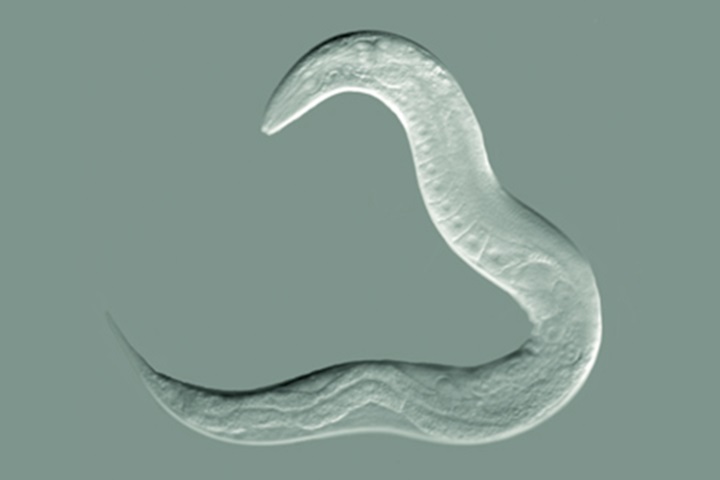From Alexander the Great thousands of years ago to Silicon Valley, which is at the forefront of science and technology, mankind has never given up the study of immortality (can humans live forever). Recently, scientists have successfully extended the lifespan of C. elegans (lifespan-regulating genes) by 5 times. This research is expected to open new doors to anti-ageing research.
Caenorhabditis elegans organism helps human to live forever!

Caenorhabditis elegans(Caenorhabditis elegans is a species of roundworm or nematode. It is important because much research has been done on its genetics and development) is a transparent nematode with a length of only about 1 mm, but it is currently the internationally recognized model organism for anti-ageing research. It is widely used in the screening of anti-ageing drugs and the study of drug anti-ageing mechanisms.
First of all, because many genes in this nematode are consistent with humans, their neurons, skin, intestines, muscles, and other tissues are very similar in shape and function to humans. Also, the life span of this organism is only 3 to 4 weeks. The effect of prolongation is easy to observe, so scientists can study how to extend the human lifespan by observing the impact of genetic and environmental changes on the lifespan of nematodes.
American Institute’s research on human immortality

The study by the American Institute of Zoology Institute and Nanjing University MDI mode complete cooperation, the scientists used a double mutant nematode sample, changed the translation of mRNA signal nematodes, insulin signalling pathway (IIS) and the TOR pathway made Gene editing (The TOR pathway is an intracellular signalling pathway important in regulating the cell cycle).
Previous studies have shown that changing the insulin signalling pathway (IIS) can increase the lifespan of Caenorhabditis elegans by 100%, while the change of the TOR pathway can increase the lifespan of 30%, so scientists expect the combination of the two-mutants can increase the nematode life by 130%.
However, the actual experimental results greatly exceeded the expectations of scientists, the nematode life span was extended by a full five times and survived for more than 14 weeks. A scientist who participated in the research said that this is equivalent to 400 to 500 years of human life. So! Can humans live forever
Does this mean that humans can live to be 500 years old?

The reality is not so ideal, according to the head of the MDI Biological Laboratory, Hermann Haller, MD, although the cellular pathways to control ageing have been found in Caenorhabditis elegans, it is not clear how these cellular pathways interact, so there is still a long way to go before they can be applied to the human body.
Nanjing University Report
As the author from Nanjing University said, the effect of this collaborative system expansion is not one plus one equals two (1+1 ≠ 2), but one plus one equals five (1+1=5). To develop the most effective anti-ageing therapy, we must consider the entire longevity network, not individual approaches.
However, even if this double mutant can be transferred to the human body, it may not necessarily extend the life span by 5 times. The researchers said that the human tissue structure is much more complicated than that of nematodes, and it is not only impossible to predict whether it will prolong the human lifespan, but also unknown side effects before the various systems interact.
But this research is not meaningless, Hermann Haller, MD stated
“By depicting these interactions, scientists have paved the way for much-needed therapies and can increase the healthy lifespan of rapidly ageing populations.”
In fact, in the past few years, humans have made many breakthroughs in anti-ageing research through nematodes as experimental bodies.
Google-funded anti-aging research company

As early as the 1990s, Google-funded anti-ageing research company Calico Labs used gene editing to increase the lifespan of nematodes from three to six weeks. Later, researchers have extended the lifespan of nematodes by 10 times and the lifespan of mice by 2 times. So! The human can also live forever
Harvard University Research

In 2016, a research team from the Harvard University School of Public Health revealed for the first time in nematodes the relationship between RNA splicing function and longevity. In the same year, two new studies in Cell magazine found that genetic switches that increase nematode lifespan and improve their health are also associated with the increased lifespan of mammals.
Unfortunately, none of these studies has been confirmed in humans. Dr Gordon Lithgow, a top nematode researcher, pointed out that there are 550 genes related to lifespan in C. elegans alone, while C. elegans only has 959 cells, while human cells have 40 trillion to 60 trillion.
It has been very difficult to determine how the genes related to life-long control in the nematode function, let alone to determine which genes in the human body are related to longevity, in helping humans to live forever. Humans need to “borrow another 500 years from the sky”, and even achieve immortality. I am afraid it is not so easy to achieve. However, after long-term human research, it can no longer be said that this is impossible. If humans succeed immortality is becoming a technical problem that violates the laws of nature.



